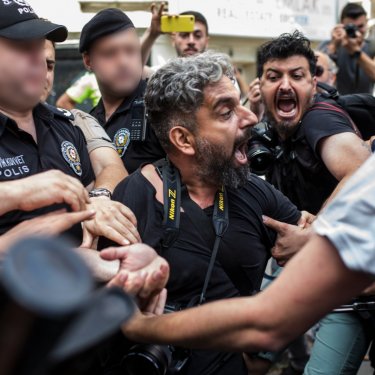Police violence against journalists in Turkey must stop

Three journalists with opposition media outlets were attacked by police in the Turkish capital, Ankara on 26 July while covering a protest against conjugal violence that was forcibly dispersed by the police. Reporters Without Borders (RSF) condemns the constant use of police violence against reporters, which jeopardises their work.
“By intervening repeatedly and arbitrarily against journalists, the police are in effect imposing a ban on journalists going to places where demonstrations are taking place,” said Erol Onderoglu, RSF’s Turkey representative. “This practice and approach are both completely unacceptable. It is time for the interior ministry to put a stop to this shameful practice and to respect press freedom.”
The three journalists attacked yesterday were Melis Ciddioglu, a reporter for PIRHA, a news website serving Turkey’s Alevi community; Kadir Devir, a cameraman with Arti TV, a TV channel that is critical of the government and is now based abroad; and Emel Vural, a reporter for the pro-Kurdish Mesopotamia Agency (MA).
They were harassed by the police and prevented from covering the demonstration by women members of the public sector union KESK in support of the Istanbul Convention – a Council of Europe Convention on preventing and combating violence against women and domestic violence.
The demonstration was triggered by the Turkish State Council’s decision on 19 July to approve President Erdogan’s 20 March decree taking Turkey out of the convention, although Turkey was the first country to ratify it (in 2012).
“Stop playing the victim,” a policeman told Ciddioglu, as she was being supported by the arm after being thrown to the ground in Sakarya Square.
When Devir told a policeman that he would file a complaint about the violence to which he had just been subjected, the policeman replied: “If you want, I’ll give you my mobile number and we’ll swap messages this evening. Go ahead and complain, if you think it’s a good idea.”
A police officer immobilised Vural just was she was covering the demonstrators’ arrival at KESK headquarter, and threw her camera to the ground.
On 26 June, AFP photographer Bülent Kiliç, was brutally arrested along with more than 300 other people near Istanbul’s Taksim Square on 26 June while he was covering a Pride March. The police cuffed his hands behind his back and took him to national police headquarters in Istanbul, where he was released in the evening. He told RSF he has filed a complaint accusing the police of “violence and illegal detention.”
This is the second year running Kiliç has been arrested while covering this march. His arrest during last year’s Pride March triggered an outcry from organisations that represent journalists, which demonstrated outside the Istanbul prefecture on 29 June 2021 for the first time since a state of emergency was proclaimed in 2016.
At least 37 journalists (including 13 women) have been attacked by police in Turkey since January 2021. The police still routinely intervene against reporters despite the many protests and complaints filed by media representatives. Turkey’s authoritarian government is trying to reduce the visibility of opposition political parties and movements in the run-up to next year’s elections.
Three exemplary decisions – a dead letter
Police violence against journalists continues in Turkey despite three decisions by the constitutional court since 2019 that resulted in charges being brought against a total of nine police officers accused of attacking and detaining three journalists – Erdal Imrek of Evrensel-Universel, Beyza Kural of Bianet.org and Gökhan Biçici of Dokuz8haber.
Gökhan Biçici, Beyza Kural and Erdal Imrek have exposed the reluctance of Turkey’s courts to prosecute police officers for violence against reporters but, thanks to their determination in taking their cases to the Constitutional Court, nine police officers are now in the dock.
The trial of three of these police officers, who are attached to the Istanbul security department and who are accused in connection with Biçici’s violent arrest nine years ago, is due to begin on 30 June before an Istanbul criminal court.
Biçici was arrested while trying to cover major protests on 15 June 2013 in Istanbul’s Gezi Park, where environmentalists were preventing a construction project from going ahead. Lower court decisions to dismiss his case against the police officers were overturned by the Constitutional Court on 8 June 2021, forcing the Istanbul prosecutor’s office to charge them.
The trial of three police officers accused of attacking and then detaining Imrek, a former reporter for the daily newspaper Evrensel (Universal), began on 24 June in Istanbul. In Istanbul on 31 May 2014, after separating Imrek from demonstrators and isolating him, the police officers kicked him several times and sprayed pepper spray in his face.
